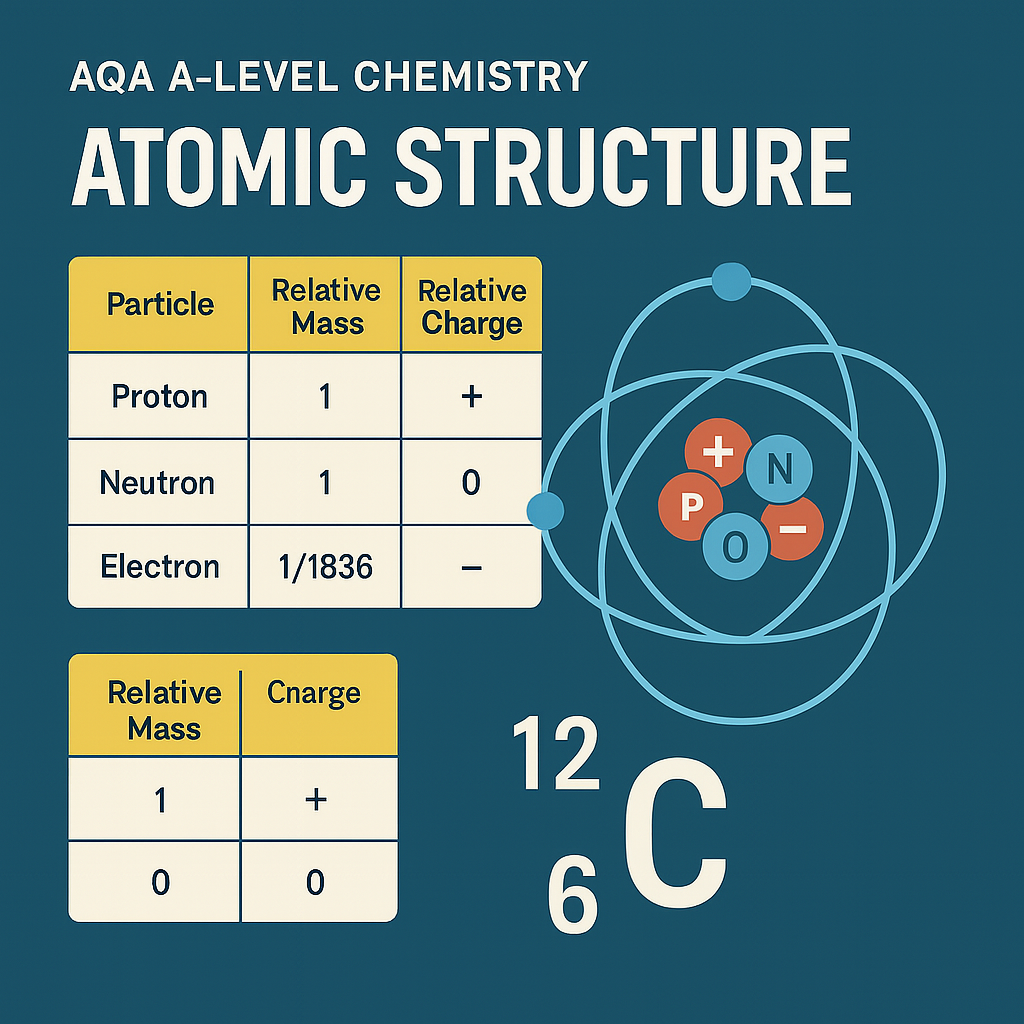Common Mistakes in AQA Chemistry Exams – And How to Avoid Them
It’s easy to think exam success is about memorising facts—but in AQA Chemistry, technique matters just as much.
When students open their AQA Chemistry exam papers—whether at GCSE or A-Level—they often feel prepared. They've revised, done past papers, and memorised the content. Yet many walk away disappointed by their grade. Why?
Because marks aren’t just lost on what you don’t know. They're lost on avoidable mistakes—misread questions, misused terms, calculation slips, or misunderstanding the exam's style.
In this blog, we’ll cover the most common mistakes AQA Chemistry students make, explain why they happen, and give you practical tips to avoid them in future exams.
Why Understanding Mistakes Is as Important as Revising Content
Most revision focuses on topics: rates of reaction, bonding, pH calculations, mechanisms. But in reality, most students lose marks because of how they answer, not what they know.
AQA Chemistry exams are precise. Examiners look for specific terms, steps, and explanations. You can have the right idea—but still lose marks if you don’t communicate it clearly, structure your answer correctly, or use the right keywords.
So, learning to avoid common pitfalls is just as important as revising topics. Let’s break them down.
Mistake #1: Misreading the Command Word
AQA uses command words like:
State
Describe
Explain
Calculate
Suggest
Evaluate
Compare
Each requires a different kind of answer. Many students lose marks by writing too much, too little, or missing the point entirely.
Examples:
Describe wants you to say what you see – no need to explain.
Explain wants a reasoned cause-and-effect answer – “because…”
Suggest often means applying knowledge to an unfamiliar situation.
✅ Fix it:
Make a revision sheet with definitions and examples of each command word. Practise identifying them in past questions.
Mistake #2: Leaving Out Units in Calculations
You might get the correct numerical answer but forget to include the unit—and lose a mark.
Commonly forgotten units:
Energy (kJ or J)
Volume (dm³ or cm³)
Concentration (mol/dm³)
Mass (g)
Units are part of the answer. Some questions award a mark just for the unit.
✅ Fix it:
Always write units as part of your final answer.
Label intermediate steps.
Include units in your calculator where relevant.
Mistake #3: Not Showing Working in Calculation Questions
Some students write just the final answer. If it’s wrong, they lose all the marks—even if they were on the right track.
AQA awards method marks even for incorrect answers if the process is clear.
✅ Fix it:
Always write the formula you're using.
Substitute in values with units.
Carry all decimal places until the final answer, then round correctly.
Circle or box your final answer.
Mistake #4: Mixing Up Definitions
Students often confuse:
Atom / molecule / ion
Mass number / atomic number
Enthalpy of formation / combustion
Reduction / oxidation
Examiners look for precise wording. A vague or incomplete definition often gets 0 marks.
✅ Fix it:
Make flashcards of all key definitions from the AQA specification. Learn them word-for-word. Practise writing them from memory and checking for accuracy.
Mistake #5: Using Casual or Everyday Language
In science, vague language loses marks.
Examples:
Saying “it gets heavier” instead of “mass increases”
Saying “the substance disappears” instead of “dissolves”
Saying “it reacts more” instead of “has a faster rate of reaction”
✅ Fix it:
Train yourself to use scientific terms. Read mark schemes to see which words are rewarded. If you're not sure of the exact term, write the clearest and most accurate version you can.
Mistake #6: Writing Too Much or Waffling
Especially on long-answer questions, some students write paragraphs without clear structure. They lose time and marks by not getting to the point.
Examples of waffle:
Repeating the question
Writing general facts instead of answering the specific scenario
Including irrelevant information
✅ Fix it:
Use the number of marks to guide your response length.
Start with the key point first.
Write in clear bullet points or structured sentences.
Reread the question before you start answering.
Mistake #7: Poor Graph or Diagram Skills
Students lose marks for:
Missing units on axes
Not using full scale of graph paper
Incorrectly plotting points
Mislabelled or undrawn lines of best fit
Inaccurate drawings of apparatus
✅ Fix it:
Practise plotting graphs using past Paper 3 or required practical questions.
Use a pencil, ruler, and sharp labelling.
Memorise correct apparatus setup diagrams (e.g. for distillation or gas collection).
Mistake #8: Weak Practical Knowledge
AQA loves integrating required practicals—even in Paper 2.
Students lose marks by:
Forgetting why repeat readings are important
Not identifying control variables
Misunderstanding the purpose of a technique (e.g. chromatography)
✅ Fix it:
Create revision notes for all required practicals
Learn: equipment, steps, variables, risks, and conclusions
Practise exam questions that ask you to design or evaluate an experiment
Mistake #9: Confusing Key Concepts
Some common mix-ups include:
Endothermic vs exothermic
Oxidation vs reduction
Group vs period on the periodic table
Alkali vs base
Strong acid vs concentrated acid
These may seem basic, but even high-level students get caught out under pressure.
✅ Fix it:
Make a “common confusion” sheet. Write each pair of terms side by side, with definitions, diagrams, and examples.
Mistake #10: Not Revising the ‘Easy Marks’
Students often focus too much on difficult topics—and miss the questions everyone should get right.
Examples:
Trends in the periodic table
Identifying ions in flame tests
Interpreting pH values
Simple moles questions
These marks add up quickly and often determine grade boundaries.
✅ Fix it:
Do a quick review of:
Word equations and symbols
State symbols
Key trends and patterns
Required practical recall
Aim for 100% on the easier questions before you tackle the tough ones.
Mistake #11: Leaving Questions Blank
Many students skip a question because they feel unsure—especially for extended writing or “suggest” questions.
But “suggest” means take a reasoned guess, based on your knowledge. A wrong-but-reasonable answer can still get 1–2 marks.
✅ Fix it:
If you don’t know:
Write down what you do know about the topic
Link it logically to the question
Never leave a question completely blank
Mistake #12: Running Out of Time
Some students spend too long on early questions and rush the last few pages. This leads to missed marks—even on topics they know well.
✅ Fix it:
Practise timed papers regularly.
Allocate time by marks (e.g. 1.5 minutes per mark for GCSE).
Move on if you’re stuck—come back later if time allows.
Don’t write full answers for 1-mark questions.
Mistake #13: Not Reviewing the Mark Scheme
Students often practise past papers—but never check the marking logic. They don’t learn what wording is rewarded or how method marks work.
✅ Fix it:
After each paper:
Mark it yourself using the official AQA mark scheme
Highlight key terms that gained marks
Keep a “mistakes tracker” of common slips and how to fix them
Mistake #14: Misinterpreting Multi-Step Questions
Multi-part questions (a, b, c) often build on each other. If students get (a) wrong, they panic and leave (b) blank—even though (b) is often independently markable.
✅ Fix it:
Keep going, even if you’re unsure about earlier parts.
Use your answer from (a) in (b), even if it might be wrong.
Stay calm and break the question into steps.
Mistake #15: Overcomplicating Simple Questions
Sometimes students overthink easy questions and write too much—or talk themselves into the wrong answer.
✅ Fix it:
If the question is worth 1–2 marks, keep it simple. Trust your revision and stick to what the question asks.
How to Avoid These Mistakes in the Real Exam
Here’s a revision routine to help you avoid common mistakes:
Do a past paper under timed conditions
Mark it yourself using the AQA mark scheme
Write down mistakes in a revision log
Look up keywords and definitions you got wrong
Redo the question a week later from memory
Test yourself on those weak areas again before the exam
This loop will help you become more accurate, confident, and consistent.
Final Thoughts: Success Comes from Strategy, Not Just Knowledge
It’s easy to think exam success is about memorising facts—but in AQA Chemistry, technique matters just as much. The most successful students avoid marks slipping through their fingers by:
Reading the question carefully
Thinking like an examiner
Showing their working
Reviewing their own mistakes
If you can fix these 15 errors in your revision, your grade will rise—even if your content knowledge stays the same.
Need Help With AQA Chemistry Exam Technique?
Book a 15 mins consultation with Dr Marguerite Quinn, expert online tutor specialising in AQA Chemistry exam success. With tailored support in revision planning, past paper technique, and feedback on written responses, Marguerite helps students reach their potential—one smart correction at a time.





Understand AQA A-Level Chemistry Section 3.1.1.2 on mass number and isotopes. Learn key definitions, isotope notation, calculations, and how this topic builds your scientific and exam skills.